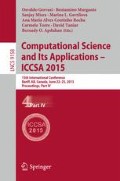Abstract
The scheduling problems are very common in any industry or organization. The software project management is frequently faced with different scheduling problems. We present the Resource-Constrained Project Scheduling problem as a generic problem in which different resources must be assigned to different activities, so that the make span is minimized and a set of precedence constraints between activities and resource allocation to these activities are met. This Problem is a NP-hard combinatorial optimization problem. In this paper we present the model the resolution of the problem through the Artificial Bee Colony algorithm. The Artificial Bee Colony is a metaheuristic that uses foraging behavior of honey bees for solving problems, especially applied to combinatorial optimization. We present an Artificial Bee Colony algorithm able to solve the Resource-Constrained Project Scheduling efficiently.
Access this chapter
Tax calculation will be finalised at checkout
Purchases are for personal use only
Preview
Unable to display preview. Download preview PDF.
References
Bouleimen, K., Lecocq, H.: A new efficient simulated annealing algorithm for the resource-constrained project scheduling problem and its multiple mode version. European Journal of Operational Research 149(2), 268–281 (2003)
Chen, R.-M., Wu, C.-L., Wang, C.-M., Lo, S.-T.: Using novel particle swarm optimization scheme to solve resource-constrained scheduling problem in psplib. Expert systems with applications 37(3), 1899–1910 (2010)
Chiarandini, M., Di Gaspero, L., Gualandi, S., Schaerf, A.: The balanced academic curriculum problem revisited. Journal of Heuristics 18(1), 119–148 (2012)
Dorndorf, U., Pesch, E., Phan-Huy, T.: A time-oriented branch-and-bound algorithm for resource-constrained project scheduling with generalised precedence constraints. Management Science 46(10), 1365–1384 (2000)
Hartmann, S.: A competitive genetic algorithm for resource-constrained project scheduling. Naval Research Logistics (NRL) 45(7), 733–750 (1998)
Herbots, J., Herroelen, W., Leus, R.: Experimental investigation of the applicability of ant colony optimization algorithms for project scheduling. DTEW Research Report 0459, 1–25 (2004)
Karaboga, D.: An idea based on honey bee swarm for numerical optimization. Technical report, Technical report-tr06, Erciyes university, engineering faculty, computer engineering department (2005)
Kempf, K., Uzsoy, R., Smith, S., Gary, K.: Evaluation and comparison of production schedules. Computers in industry 42(2), 203–220 (2000)
Mingozzi, A., Maniezzo, V., Ricciardelli, S., Bianco, L.: An exact algorithm for the resource-constrained project scheduling problem based on a new mathematical formulation. Management Science 44(5), 714–729 (1998)
Nonobe, K., Ibaraki, T.: Formulation and tabu search algorithm for the resource constrained project scheduling problem. In: Essays and Surveys in Metaheuristics, pp. 557–588. Springer (2002)
Pritsker, A.A.B., Waiters, L.J., Wolfe, P.M.: Multiproject scheduling with limited resources: A zero-one programming approach. Management science 16(1), 93–108 (1969)
Schirmer, A.: Case-based reasoning and improved adaptive search for project scheduling. Naval Research Logistics (NRL) 47(3), 201–222 (2000)
Valls, V., Ballestin, F., Quintanilla, S.: Justification and rcpsp: A technique that pays. European Journal of Operational Research 165(2), 375–386 (2005)
Zhang, H., Li, H., Tam, C.: Particle swarm optimization for resource-constrained project scheduling. International Journal of Project Management 24(1), 83–92 (2006)
Zhang, H., Li, X., Li, H., Huang, F.: Particle swarm optimization-based schemes for resource-constrained project scheduling. Automation in Construction 14(3), 393–404 (2005)
Author information
Authors and Affiliations
Corresponding author
Editor information
Editors and Affiliations
Rights and permissions
Copyright information
© 2015 Springer International Publishing Switzerland
About this paper
Cite this paper
Crawford, B., Soto, R., Johnson, F., Vargas, M., Misra, S., Paredes, F. (2015). A Scheduling Problem for Software Project Solved with ABC Metaheuristic. In: Gervasi, O., et al. Computational Science and Its Applications -- ICCSA 2015. ICCSA 2015. Lecture Notes in Computer Science(), vol 9158. Springer, Cham. https://doi.org/10.1007/978-3-319-21410-8_48
Download citation
DOI: https://doi.org/10.1007/978-3-319-21410-8_48
Published:
Publisher Name: Springer, Cham
Print ISBN: 978-3-319-21409-2
Online ISBN: 978-3-319-21410-8
eBook Packages: Computer ScienceComputer Science (R0)

